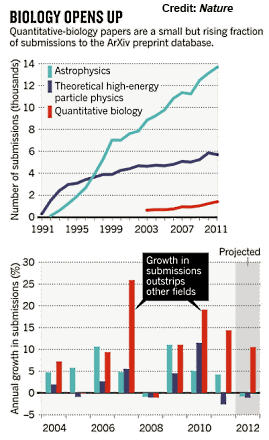|
News & Views item - August 2012 |
![]() Life Sciences Beginning to Look to arXiv. (August 1, 2012)
Life Sciences Beginning to Look to arXiv. (August 1, 2012)
Paul Ginsparg, the theoretical physicist who founded the preprint server arXiv
at the Los Alamos National Laboratory in 1991 and later moved to Cornell
University is witnessing what may become a "sea change" in its use. Primarily, a site for
depositing preprints from theoretical physicists and astrophysicists, and while
the number of biology papers on the server is still small in comparison with
physical-sciences preprints, there has become an increasing rate of interest
from the life sciences.
is witnessing what may become a "sea change" in its use. Primarily, a site for
depositing preprints from theoretical physicists and astrophysicists, and while
the number of biology papers on the server is still small in comparison with
physical-sciences preprints, there has become an increasing rate of interest
from the life sciences.
From Professor Ginsparg's viewpoint: "It’s wonderful if biologists are belatedly joining the late twentieth century," he quips. “Welcome to the party; better late than never." The fear of being scooped or precluding publication by depositing a preprint has been very much on the mind of many researchers in the life sciences.
Richard Neher, a population geneticist at the Max Planck Institute for Developmental Biology in Tübingen, Germany, told NatureNews: "I grew up in the physics community, and putting things up on arXiv is a natural thing for me to do." So far Dr Neher has co-authored more than ten submissions to arXiv since 2004.
Statistical geneticist Graham Coop of the University of California, Davis just over a fortnight ago posted a paper on arXiv analysing genetic relatedness among neighbouring European populations, and while he admits that postings on the serve are still "more of a trickle" than a trend he told Nature he believes: "Biology will soon have to embrace this trend fully: the speed of discussion, comment and pre-publication review allowed is needed in biology more than most fields."
It is true that some journals won't publish papers where preprints have been posted on arXiv, but in Professor Ginsparg's view prepublication is more of a deterrent to being scooped, and arXiv is routinely used to check disputes over priority. According to Nature in the 21 years since arXiv began, Ginsparg has seen astrophysicists, computer scientists and others go from sceptics to devotees. "Once a community adopts arXiv, it never seems to relinquish it."
So will we be witnessing the beginning of wide adoption of true and immediate open access through the preprint server? It's not only possible, it's probable, and it could be with us before the end of the decade.